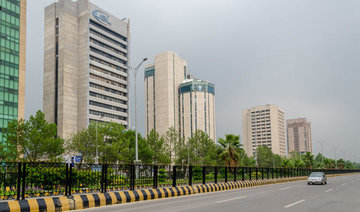KARACHI: In an attempt to allay the concerns of Financial Action Task Force (FATF), Pakistan has stated that it will have an action plan ready by June this year. The country hopes that as a result it will be off the organization’s grey list within a year.
In an exclusive interview with Arab News, Dr. Miftah Ismail, the adviser to the prime minister on finance, said that the plan would be formulated and executed within three months to allay the concerns of the international community.
“Yesterday, I talked to the representative of FATF and assured him that we would make an action plan,” he said. “By implementing that action plan, Pakistan will be off the grey list within a year.”
The FATF was established in July 1989 by a Group of Seven summit in Paris. Its objectives are to set standards and promote effective implementation of legal, regulatory and operational measures for combating money laundering, terrorist financing and other related threats to the integrity of the international financial system.
Pakistan is due to be added to the FATF grey list in June, despite the country’s attempts to reassure the international community.
“During our meetings with the representatives of FATF, Pakistan presented its point of view, but western countries, particularly the United States, were not ready to listen to us,” said Ismail.
A recently announced tax-amnesty scheme had added to FATF concerns about Pakistan, but Ismail said this was being addressed.
“They simply wanted us to give them assurance in writing that we were not violating anti-money laundering laws,” he said. “We have given them assurance in writing that the amnesty scheme is not for criminal offenses, but for tax evasion.”
Ismail said that the addition of Pakistan to the grey list of would only increase the accounting requirements.
The country is facing a burgeoning current-account deficit that has risen to $10.4 billion, mainly due to increased imports and a fall in exports.
However, he said the government saw no need to seek financial assistance from the International Monetary Fund, given the recent devaluation of the rupee and signs that exports were starting to rise again.
Ismail ruled out a further devaluation of currency, after the already-completed 10 percent depreciation, saying the market has positively responded to the government’s move.
“People were expecting a 10 percent devaluation of the Pak rupee, which was achieved without increasing the rate of inflation in the country,” he said.
“We feel that there is no need for further devaluation.
“We have twice devalued our currency and our exports increased by 24 percent in March. We think that we are moving on the right path to reduce the current-account deficit. Obviously, remittances are also increasing.”
In addition, he ruled out the possibility of floating bonds/Sukuk on the international market during the current fiscal year.
“If we are elected and form the next government, we will go to the international market in November or December to raise funds,” he said, without giving any further details.
However, Ismail did not rule out the possibility of asking friendly countries for deficit financing, though he added that no such move was under discussion at present.
“We can go to any country,” he said. “For example, if we want to go to Saudi Arabia we will ask them for oil-export credit but no present talks are going on about this.”
Regarding the shifts in economic policy since the departure of former finance minister Ishaq Dar in November 2017, he said the only change was the devaluation of the currency.
“I did what I deemed best in the interests of Pakistan,” he added.
Ismail also addressed the frequent power outages in the port city of Karachi, despite the government’s claim of adding nearly 10,000 megawatts of electricity to the national grid.
“The load shedding in Karachi is the result of a tussle between the Sui Southern Gas Company and K-Electric,” he said.
He added that the government was “trying to resolve the issue as soon as possible.”
Looking ahead to the budget that will be presented on April 27, Ismail confirmed that the duty imposed to discourage imports of finished goods will remain, though it would be abolished for intermediate goods.
“This budget will be appreciated by all political parties,” he said. “The next government can make small changes to it, but 90 percent of the budget will be the one we have at present.”


























